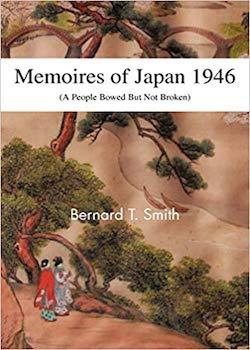Memoires of Japan, 1946 (A People Bowed But Not Broken)

By Bernard T. Smith
Trafford Publishing, North America & international, 2012
199 pages including index, ISBN978-1-4669-6309-2 (sc)
A Japanese translation of this book is also available for Kindle and can be purchased on Amazon Japan and Amazon UK.
Review by Sir Hugh Cortazzi
Bernard Smith describes in this memoir his life as an RAF officer on the staff of the British Commonwealth Air Force (BCAIR) Headquarters at Iwakuni in 1946. BCAIR was part of the British Commonwealth Occupation Force (BCOF), which had been allocated by General MacArthur, the Supreme Commander Allied Powers (SCAP) responsibility for the allied occupation of prefectures in western Honshu and the island of Shikoku. But military government remained in the hands of the Americans and BCOF’s role was a limited one.
Smith quotes in this context a parody of the Lord’s prayer written “by one our own troops.” This began: “Our General who art in Tokyo. Douglas MacArthur be thy name,…Give us this day our daily directive, And forgive us for trespassing in the US zone,…And lead us not into insanity, But deliver us from Iwakuni,…”
His job at BCAIR headquarters was a frustrating and difficult one. He had to cope with a plethora of problems from arranging accommodation for the AOC (Air Vice Marshal Bouchier) to ensuring that the multifarious needs of the headquarters were met. One of the most trying was dealing with local procurement at a time of great scarcity.It is difficult for those who did not get to Japan until after the economic ‘miracle’ to realise not only the destruction of Japanese infrastructure and cities which resulted from the bombing raids, but also the very real poverty not to say hunger which Japanese faced in 1946. That these were the result of the failure of Japan’s leaders in 1945 to face the fact of Japan’s defeat does not mean that we should overlook the suffering. Smith was conscious of these facts from his arrival in Kure, from his passage through Hiroshima and from the devastation even in the small city of Iwakuni.
Smith who had learnt some Japanese at the School of Oriental and African Studies before he went out to India and Burma soon established friendly relations with local families and tried to develop cultural exchanges. He was frustrated by the anti-fraternisation rules which BCOF tried to enforce. These stemmed not only from anti-Japanese sentiments in British Commonwealth countries, but were “justified” by the mistaken belief that they would reduce black-market activity by allied personnel and reduce the risk of men contracting sexual diseases. Anti-fraternisation rules which were much more stringently applied in areas occupied by British Commonwealth forces than in areas under American control were silly and mistaken. Fortunately the more intelligent officers, including Bernard Smith, and some other ranks in BCAIR found ways of getting round the rules.
Bernard Smith arrived in Iwakuni in February 1946. I arrived in late June of that year and spent six months working with the RAF Provost Unit on security duties before going on to Miho and Yonago in Tottori prefecture for eight months. Bernard Smith says that our paths did not cross (although surely we must have met at least in the officers mess?). At any rate we shared many local friends not least the Namiwakis, especially Shizue who acted as an interpreter first at headquarters and later at the RAF police unit in Iwakuni town where I worked.
Reading Bernard’s account of his time in Iwakuni brought back many nostalgic memories of my own time there which was briefly touched on in my memoir, Japan and Back and Places Elsewhere, Global Oriental, 1998.
Members of the Japan Society may have seen the mock-up of Iwakuni’s famous Kintai bridge which was exhibited at the Japanese Embassy in London last year. They will also no doubt have seen copies of the colour prints of the bridge by Hiroshige. This book will give them another picture of this city in Yamaguchi prefecture in western Japan which remains a Naval air base and was once the castle town of the Kikkawa family.
We must be grateful to Bernard for keeping such detailed notes which have enabled him to give us this snapshot of a brief episode in his service in the RAF 67 years ago.

